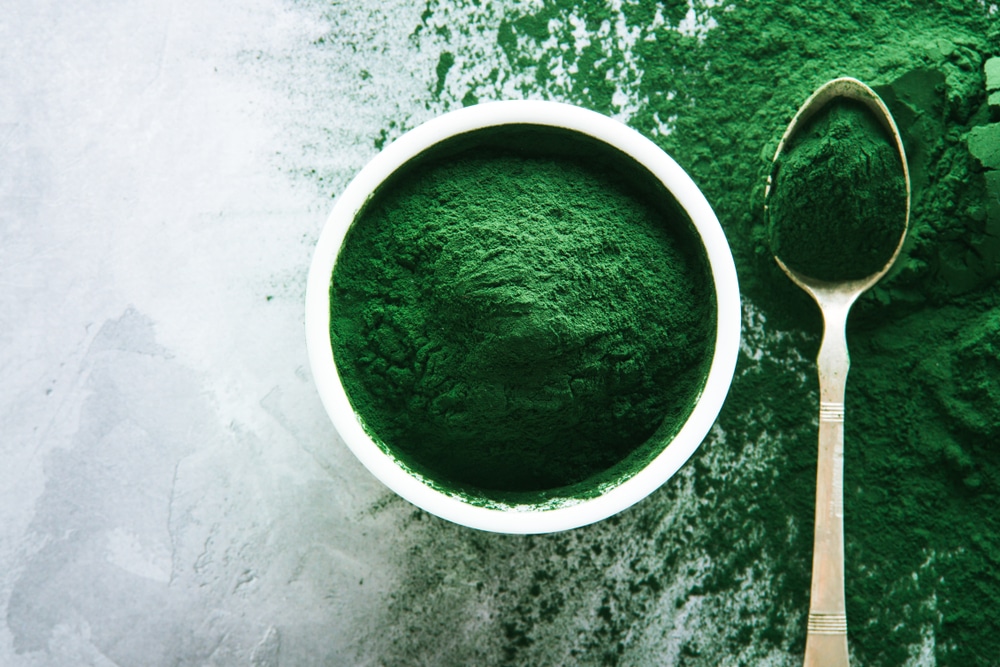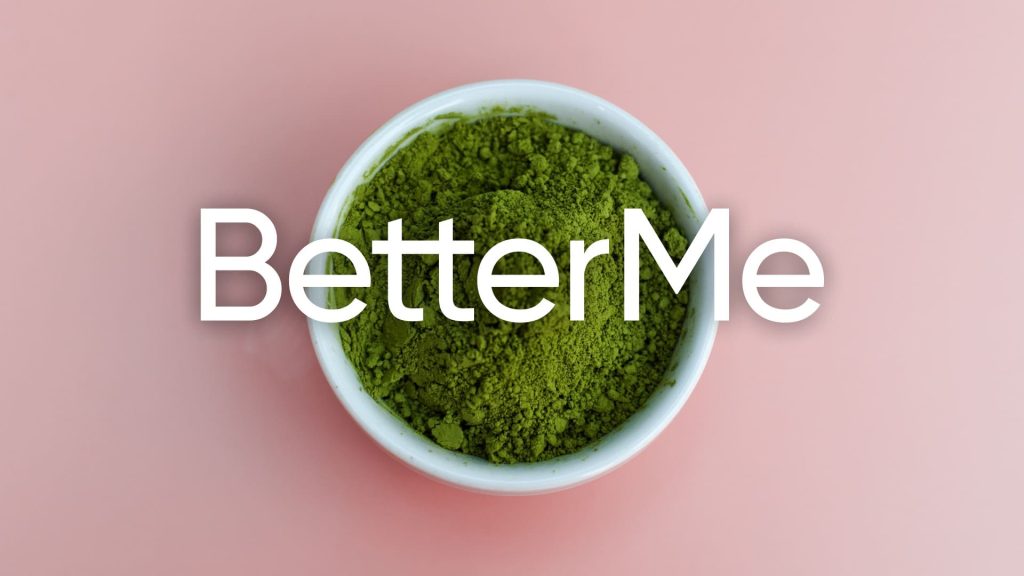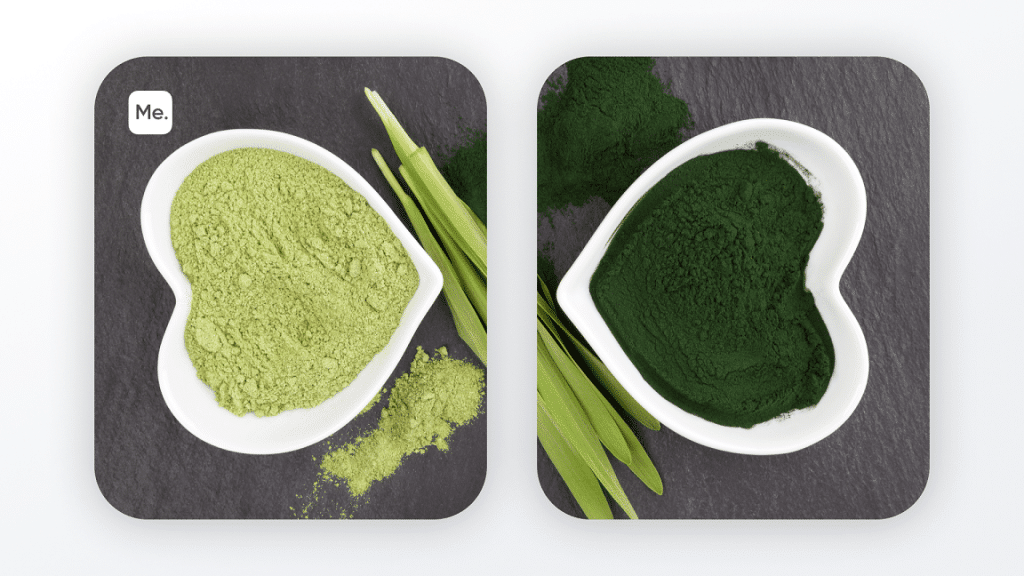Spirulina is a type of blue-green algae that grows naturally in oceans, lakes, and other bodies of water. It is considered a superfood due to its high protein content (more than 50 percent by weight) and the fact that it contains all nine essential amino acids. It also has many vitamins and minerals. In this article, we take a look at the health benefits and side effects of spirulina. We will also offer advice on how to use spirulina for maximum benefit. Read about spirulina calories, benefits and side effects below.
Get your personalized
meal plan!
How Many Calories In A Tablespoon Of Spirulina?
1 tablespoon (7g) of spirulina has 20 calories (7). The calories in spirulina come from fat, carbohydrate, and protein.
Let’s look at each of these nutrients individually.
Fat In Spirulina
Each tablespoon of spirulina contains 0.5g fat. This is 1% of the DV for adults, a very small amount. Of this total, 0.2g is saturated fatty acids, 0.1g is polyunsaturated fatty acids (PUFAs), and 0.1g is monounsaturated fatty acids (MUFAs) (7). Each of these fats play different roles in the body (1).
Saturated fats can raise LDL cholesterol, which may increase your risk of heart disease. That said, saturated fats also help the body absorb fat-soluble vitamins such as vitamin A and E.
Polyunsaturated fats can lower LDL cholesterol levels. They are essential fats that the body cannot make on its own, so they must be obtained through food or supplements.
Monounsaturated fats are beneficial to the cardiovascular system. They can help lower LDL cholesterol levels and maintain HDL cholesterol levels.
Carbohydrates In Spirulina
1 tablespoon of spirulina contains 1.7g of carbohydrates. Of these, dietary fiber makes up 0.3g while sugars make up 0.2g (7). The remaining 1.2g of carbohydrate is starch.
Sugars such as glucose, fructose and sucrose are simple carbohydrates found naturally in many foods and drinks. They also form the basis for more complex carbohydrates such as starches and dietary fiber (16). The main role of sugars and starches is to provide energy for the body. However, too much sugar can lead to tooth decay and weight gain, which may bring about an increased risk of heart disease and Type 2 diabetes (8).
Dietary fiber is a type of carbohydrate found naturally in plant foods such as fruits, vegetables, whole grains, seeds and nuts. Dietary fiber cannot be completely digested by the body because it has multiple strands. It helps us by regulating bowel movements and preventing constipation. It also helps to lower LDL cholesterol levels and regulate blood sugar levels.
There are two forms of dietary fiber: soluble and insoluble (11). Soluble dietary fiber dissolves in water to form a gel-like substance that slows digestion. Insoluble fiber does not dissolve in water, so it passes through the body relatively intact. Both forms of dietary fiber help to keep you regular.
Read More: Blue Spirulina Facts, Health Benefits And Side Effects
Protein In Spirulina
Spirulina contains 4g protein per tablespoon. All essential amino acids are present, making it a complete source of protein (12). It also has a fairly high biological value (BV) rating of 75%. This means that the protein in spirulina is readily absorbed and utilized by the body.
Protein serves many important roles in the body. It is a major building block of connective tissue, skin and muscle. It also plays a vital role in metabolism by providing a source of energy for the body while regulating blood sugar levels.
Health Benefits Of Spirulina
Due to its rich nutritional profile, spirulina offers various health benefits including:
Powerful Antioxidant Properties
Oxidative stress can be harmful for your DNA and cells. It can lead to cell death, which can cause inflammation throughout the body. But spirulina contains potent antioxidants that neutralize free radicals before they harm your cells (19).
Spirulina contains an active component called phycocyanin that gives it a unique blue-green color. This antioxidant breaks down into phycocyanobilin after being metabolized by the body. Phycocyanobilin stimulates cells to produce antioxidant enzymes that protect against damage caused by oxidative stress (9).
Supports Immune Function & Reduces Inflammation
Spirulina is rich in beta-carotene and other immune-boosting phytonutrients that stimulate the production of white blood cells. These immune cells play a vital role in protecting your body from infections and diseases. Spirulina may also help reduce inflammation throughout the body, which might help reduce pain and swelling associated with various health conditions (5).
It is also rich in B vitamins and iron, which help with energy production.
Improves Digestion & Gut Health
Spirulina contains dietary fiber that helps increase the bulk and frequency of bowel movements (13). It also helps promote a healthy gut microbiome.
May Be Effective Against Anemia
Spirulina is also rich in iron, which helps maintain healthy levels of iron in your body to support normal red blood cell production. Iron deficiency can lead to anemia, a condition that causes fatigue and shortness of breath (14).
If you wish to free yourself from all the extra pounds that have been weighting you down for way too long, start using the BetterMe app and overhaul your entire life!
Helps Maintain Optimal Weight & Fights Cravings
Spirulina is low in calories yet high in protein, making it a great addition to a weight loss diet. It helps suppress appetite and cravings for unhealthy foods while providing a healthy source of protein. This can help you lose weight without depriving your body of essential nutrients.
Helps Maintain Healthy Blood Pressure Levels
Spirulina is rich in magnesium, potassium and calcium that are important for regulating blood pressure levels. It also contains compounds called phytosterols that may help lower LDL cholesterol levels to support healthy blood pressure (4)
Nutrients in Spirulina Can Protect Against Chronic Diseases
Spirulina contains high levels of phycocyanobilin, which has been seen to help deter cancer cell growth in a test tube (3). It also has potent antioxidant properties that fight against neurodegenerative diseases such as Alzheimer’s and Parkinson’s disease (15). People who regularly consume spirulina might be less likely to develop these serious health conditions, however this is only a theory at present.
Can Lower “Bad” LDL And Triglyceride Levels
Consuming spirulina on a regular basis has been found to help reduce LDL or “bad” cholesterol levels and triglyceride levels (20). This can protect against arteriosclerosis, heart disease, and stroke.
May Improve Muscle Strength And Endurance
Spirulina helps reduce markers for oxidative stress such as malondialdehyde and raises the activity of blood superoxide dismutase (18). This could help prevent skeletal muscle damage, allowing you to get more out of your workouts.
Side Effects Of Spirulina
Spirulina is generally well-tolerated by most people, but there are some potential side effects that you should be aware of before adding it to your diet.
Risk Of Contamination
Spirulina is a form of cyanobacteria, which can carry microcystins that are toxic to humans (10). This means it must be harvested from non-toxic sources and carefully tested to ensure it does not contain dangerous levels of toxins.
Allergic Reaction
Spirulina can cause an allergic reaction in people who are sensitive to the blue-green algae (2). Symptoms of this side effect include shortness of breath, hives, swelling, and severe itching.
Read More: Canola Oil Nutrition Facts, Health Benefits, And Side Effects
Interferes With Certain Medications
Spirulina contains compounds called phycocyanobilin and phycocyanin that can interact with transplant medication, blood thinners, diabetes medications, and immunosuppressants (6). This can increase the risk of side effects or reduce the effectiveness of these medications.
May Worse Autoimmune Conditions
Spirulina may make autoimmune conditions such as rheumatoid arthritis, lupus, and multiple sclerosis worse (6). If you have an autoimmune disease, talk to your doctor before adding spirulina to your diet.
Interferes With Thyroid Hormones
Spirulina, like other sea vegetables, contains a high amount of iodine, which is involved in thyroid hormone production. If you have a thyroid disorder such as hypothyroidism, hyperthyroidism, Hashimoto’s or Graves disease, or any other thyroid condition, talk to your doctor first to find out if an iodine-rich food or supplement such as spirulina is safe for you or not.
Reactions For People With Phenylketonuria (PKU)
Spirulina and other algae also contain phenylalanine, a naturally occurring amino acid that people with PKU must limit in their diet (17). This can cause serious side effects, so talk to your doctor before adding spirulina or any other algae to your diet.
How To Avoid Spirulina Side Effects
Here are a few tips for avoiding the side effects of this superfood:
Always Consult A Doctor Before Adding It To Your Diet
Speak with your doctor before adding spirulina to your diet to make sure it’s safe for you. This is especially important if you have any pre-existing medical conditions or are taking any prescription medications, or if you are pregnant or breastfeeding.
Start With A Small Amount And Gradually Increase Intake
People who are new to spirulina should start by taking an extremely small amount, such as one-fourth of a teaspoon, to see how their body reacts. You can gradually increase your intake over a few weeks until you reach a dosage that is safe for you.
Avoid Algae Supplements From Unreliable Sources
Only purchase spirulina from reputable sources to ensure it’s free of toxins and contaminants. Purchase from trusted brands that have been tested by third party organizations to ensure they meet industry standards for purity.
Keep in mind that even certified products may not be completely free of contaminants, as dietary supplements are largely unregulated in the United States.
Yanking yourself back in shape has never been so easy with our game-changing fitness app! Start transforming your life with BetterMe!
How To Include Spirulina In Your Diet
Spirulina is available in powder and tablet form. As a powder, you can:
Add It To Smoothies
Making a superfood smoothie is one of the easiest ways to get spirulina into your diet. Add unsweetened spirulina powder to a smoothie with fresh or frozen fruit for a healthy drink that also tastes great.
Sprinkle It On Foods And Salads
You can sprinkle spirulina on just about any dish to give it an extra health boost. Sprinkling it over cereal, oatmeal, or pasta is easy and adds a slightly salty flavor that makes most foods more enjoyable.
Mix With Yogurt
Spirulina powder mixes easily into plain yogurt of any flavor for a quick snack. Make a mixture of spirulina and yogurt, add some fresh fruit like blueberries or banana, and enjoy!
Stir Into Vegetable Juices
Vegetable juices are nutritious on their own, but you can make them even better by adding a few shakes of spirulina powder before you drink it. This makes the juice taste slightly different, so most people prefer to do this when they have a cold or flu and want to get an extra boost of vitamins and minerals.
Make Energy Balls With Other Healthful Ingredients
You can use spirulina powder to make easy energy balls by combining it with almond butter, cocoa powder, honey, and oats. This makes small snacks that taste like chocolate chip cookies but are packed with nutrients you don’t always get in a cookie!
Spirulina In Tablet Form
Spirulina tablets are easy to take, simply pop one in your mouth and swallow. They tend to be pricier than the powder form, but don’t require any extra preparation or ingredients.
The Bottom Line
Spirulina is a superfood that has powerful health benefits and can help your body fight against many of the most serious illnesses. It also contains certain compounds that can interfere with medication or cause allergic reactions, so you need to be careful when adding it to your diet. Make sure you consult your doctor before adding spirulina and other algae to your diet.
DISCLAIMER:
This article is intended for general informational purposes only and does not serve to address individual circumstances. It is not a substitute for professional advice or help and should not be relied on for making any kind of decision-making. Any action taken as a direct or indirect result of the information in this article is entirely at your own risk and is your sole responsibility.
BetterMe, its content staff, and its medical advisors accept no responsibility for inaccuracies, errors, misstatements, inconsistencies, or omissions and specifically disclaim any liability, loss or risk, personal, professional or otherwise, which may be incurred as a consequence, directly or indirectly, of the use and/or application of any content.
You should always seek the advice of your physician or other qualified health provider with any questions you may have regarding a medical condition or your specific situation. Never disregard professional medical advice or delay seeking it because of BetterMe content. If you suspect or think you may have a medical emergency, call your doctor.
SOURCES:
- A healthy approach to dietary fats: understanding the science and taking action to reduce consumer confusion | Nutrition Journal (2017, biomedcentral.com)
- Anaphylaxis to Spirulina confirmed by skin prick test with ingredients of Spirulina tablets (2014, pubmed.ncbi.nlm.nih.gov)
- Anti-cancer effects of blue-green alga Spirulina platensis, a natural source of bilirubin-like tetrapyrrolic compounds – ScienceDirect (2014, sciencedirect.com)
- Antihyperlipemic and antihypertensive effects of Spirulina maxima in an open sample of mexican population: a preliminary report (2007, ncbi.nlm.nih.gov)
- Antioxidant, Immunomodulating, and Microbial-Modulating Activities of the Sustainable and Ecofriendly Spirulina (2017, hindawi.com)
- Blue-Green Algae: MedlinePlus Supplements (2021, medlineplus.gov)
- Calories in Spirulina (n.d., nutritionix.com)
- Carbohydrates – Diet and Health – NCBI Bookshelf (1989. ncbi.nlm.nih.gov)
- C-phycocyanin: a biliprotein with antioxidant, anti-inflammatory and neuroprotective effects (2003, pubmed.ncbi.nlm.nih.gov)
- Detection of Cyanotoxins in Algae Dietary Supplements (2017, mdpi.com)
- Dietary fibre in foods: a review (2012, ncbi.nlm.nih.gov)
- Functional Properties and Amino acid Profile of Spirulina platensis Protein Isolates (2016, researchgate.net)
- Health benefits of dietary fiber (2009, academic.oup.com)
- Iron Deficiency Anemia – StatPearls – NCBI Bookshelf (2021, ncbi.nlm.nih.gov)
- Neuroprotection by Spirulina platensis protean extract and phycocyanin against iron-induced toxicity in SH-SY5Y neuroblastoma cells (2008, pubmed.ncbi.nlm.nih.gov)
- Physiology, Carbohydrates – StatPearls – NCBI Bookshelf (2021, ncbi.nlm.nih.gov)
- PKU dietary handbook to accompany PKU guidelines | Orphanet Journal of Rare Diseases | Full Text (2020, biomedcentral.com)
- Preventive effects of Spirulina platensis on skeletal muscle damage under exercise-induced oxidative stress (2006, pubmed.ncbi.nlm.nih.gov)
- The antioxidant, immunomodulatory, and anti-inflammatory activities of Spirulina: an overview (2016, pubmed.ncbi.nlm.nih.gov)
- The hypolipidaemic effects of Spirulina (Arthrospira platensis) supplementation in a Cretan population: a prospective study (2014, pubmed.ncbi.nlm.nih.gov)
- Various Possible Toxicants Involved in Thyroid Dysfunction: A Review (2016, ncbi.nlm.nih.gov)














